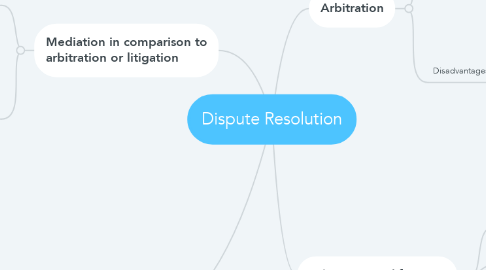
1. Mediation in comparison to arbitration or litigation
1.1. Advantages
1.1.1. 1 A fair and balanced common ground will be found
1.1.2. 2 Is not a litigated process, so is not binding, and can be renegotiated
1.1.3. 3 Cheaper than both arbitration and litigation
1.2. Disadvantages
1.2.1. 1 Decision can not be made by the mediator
1.2.2. 2 Not ideal when the two negotiating parties are in a power dynamic
1.2.3. 3 Coming to an agreement is not always the final result, which then leads to trial
2. Mediator Qualifications
2.1. 1 Neutral 3rd Party
2.2. 2 Strong communicator as a "go-between"
2.3. 3 Able to withhold judgment as they can not decide the outcome
2.4. 4 Can be flexible in their decision making
2.5. 5 Has controlled emotions
3. Arbitrator qualifications
3.1. 1 Able to "read between the lines" to understand each parties true intentions and desires
3.2. 2 Able to have foresight on how the decisions will affect the future
3.3. 3 Able to keep a fair and balanced mindset
3.4. 4 Pays close attention to the wording of every clause negotiated
3.5. 5 Has a strong understanding of contractual law
4. Arbitration
4.1. Advantages
4.1.1. 1 Can decide the outcome in binding arbitration
4.1.2. 2 Typically cheaper than litigation as it does not incur extra court and professional costs
4.1.3. 3 There is no trial as in litigation, so arbitration is typically quicker
4.2. Disadvantages
4.2.1. 1 Can be compulsory (forced by a government agency)
4.2.2. 2 The decision is final, so there are no appeals
4.2.3. 3 There is limited amount of discovery
